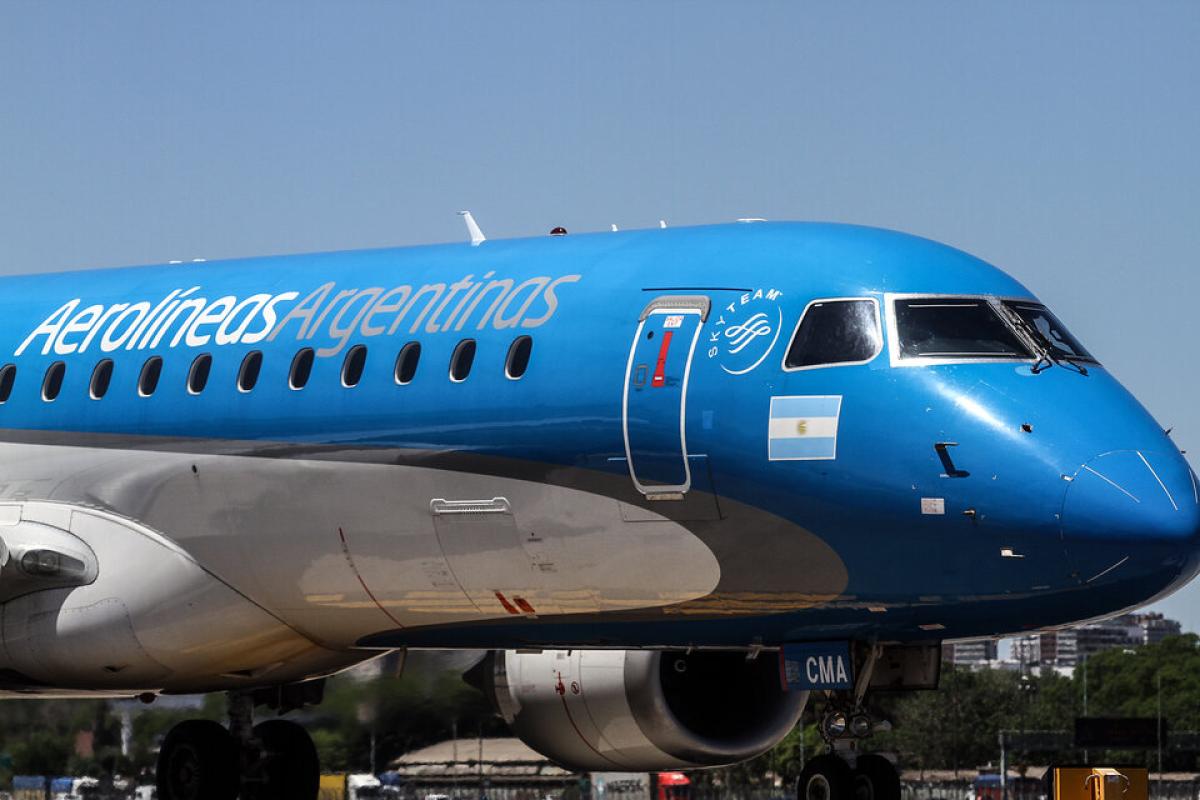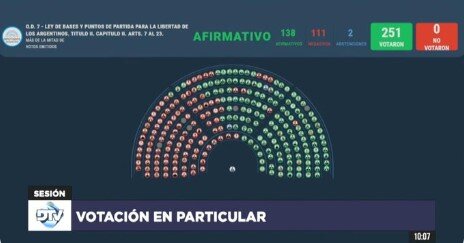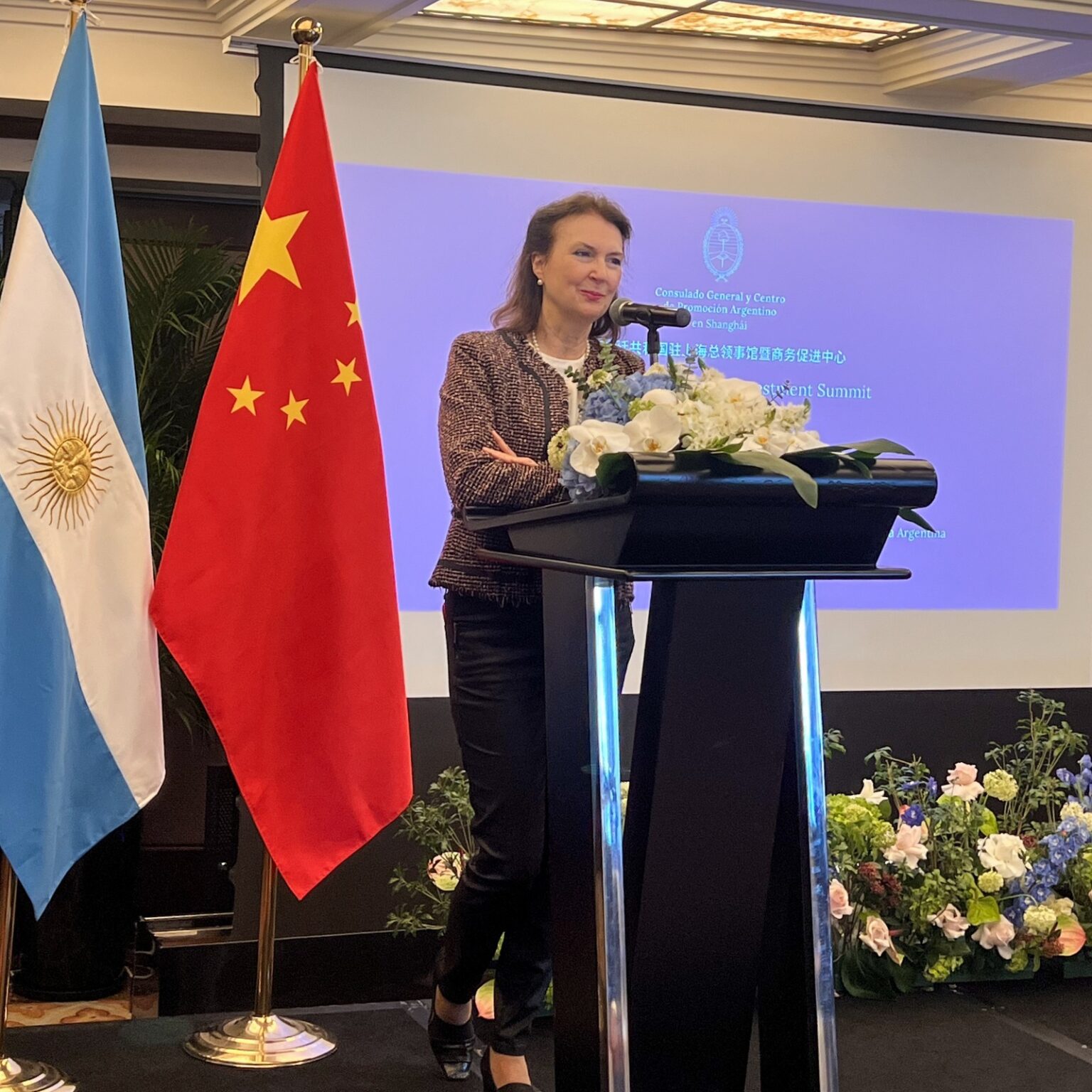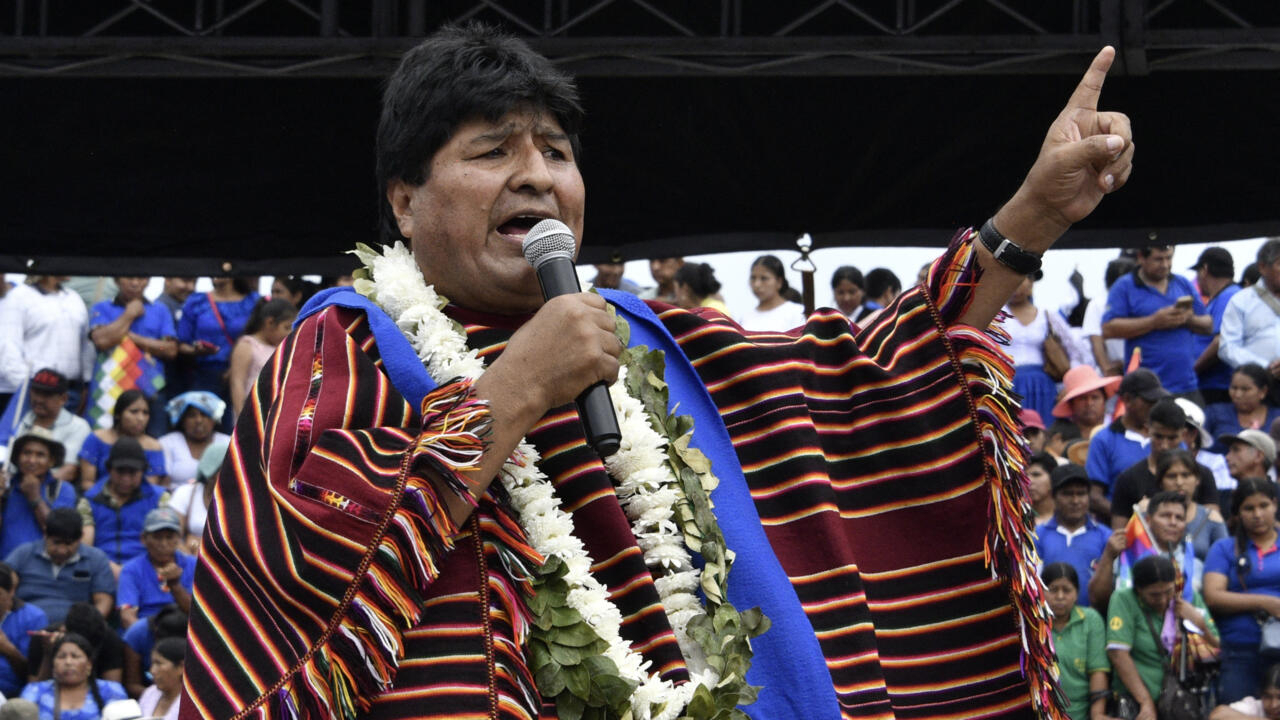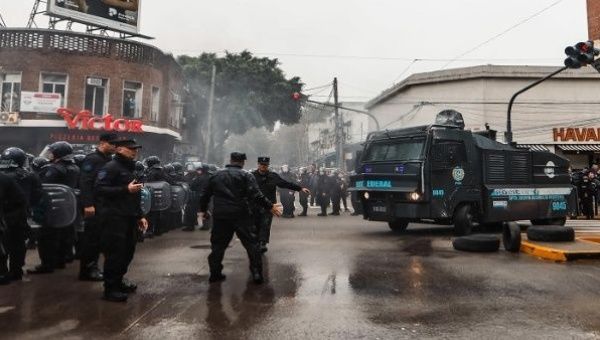Politicians Aligned With Evo Morales Warn About ‘Imminent Political Crisis’ in Bolivia (+Primaries)
MAY 16, 2024
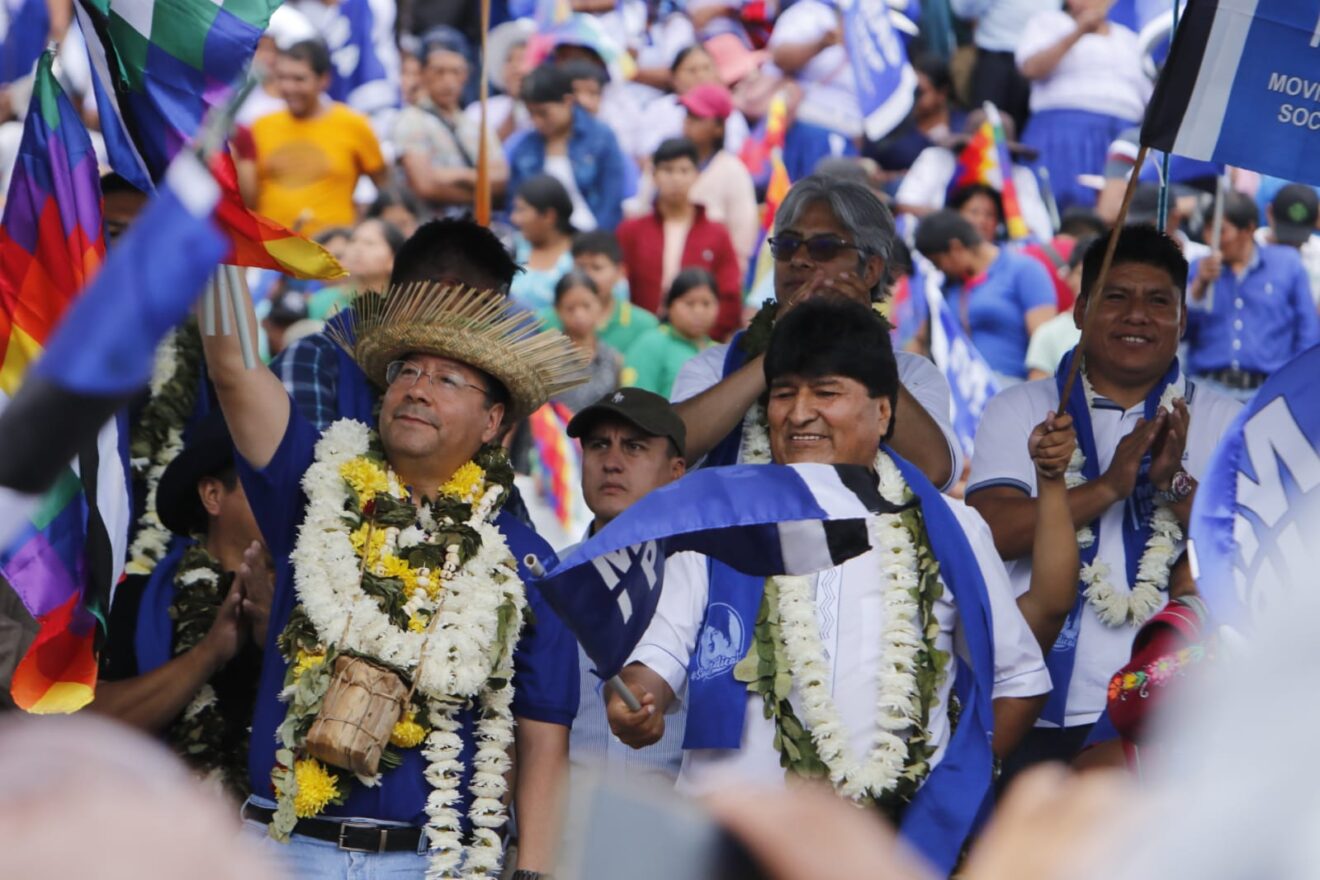
Luis Arce and Evo Morales at the celebration of the 28 years of MAS in Cochabamba, March 2023. Photo: APG/File photo.
Caracas (OrinocoTribune.com)—A group of politicians and personalities involved with the Bolivian ruling party Movement Towards Socialism (MAS) and close to former President Evo Morales published a statement expressing their view on the current schism within MAS and highlighting “the threat to democracy represented by the current government” led by President Luis Arce.
The statement, titled What is Happening in Bolivia: Open Letter from Bolivia to the International Community and published on May 12, has been signed by several MAS politicians who held important public positions during Morales’ terms, such as former minister Juan Ramón Quintana, former parliamentarian Adriana Salvatierra, former head of ALBA-TCP Sacha Llorenti, and cultural figures such as María Fernanda Rada who made a documentary on the 2019 coup against Morales, Fue Golpe, and purportedly warns about “an imminent political crisis” in the country.
Addressing “our comrades throughout the world,” the signatories stated that “currently, in Bolivia, we are going through an alarming situation that manifests an imminent political crisis” due to differences within the ruling party. “These are not superficial differences, they are of an ideological, programmatic, and ethical nature, and have direct repercussions on the way of doing politics and, above all, on what and for whom politics is done.”
The signatories went on to claim that Luis Arce, who became the president in the 2020 elections after the people of Bolivia defeated the coup, has “betrayed the people’s trust.” They accused the Arce government of bringing about an economic crisis for “having abandoned the economic model that made Bolivia an example for the entire region.” They further alleged that the president has created a serious institutional crisis “within the social organizations due to acts of nepotism promoted by the government, adoption of repressive measures against left-wing members, and the threat of proscription of our party and disqualification of the most important political leader of the popular camp: Evo Morales Ayma.”
According to the statement, President Arce is bypassing the Legislative Assembly and appropriating parliamentary powers since last year, violating the separation of powers enshrined in the Constitution of the Plurinational State of Bolivia. Among these alleged violations, the statement highlighted the issue of the government “declaring as state secret the agreements signed on the exploration of lithium.” Bolivia has the largest known reserves of this highly demanded metal, and there were indications that one of the principal objectives of the 2019 coup was to make way for foreign multinationals to get hold of Bolivia’s lithium.
Moreover, the signatories accused President Arce of “repeating neoliberal practices” of trying to coopt the social movements that form the base of the MAS party, as well as of unleashing a “judicial persecution” against MAS politicians who are not aligned with the current president. In this regard, they highlighted the government’s intentions of disqualifying Evo Morales from next year’s presidential race in collusion with the judiciary, and questioned the impartiality of the Supreme Electoral Tribunal. They compared this situation with the infamous lawfares against left-wing leaders in Latin America, including Brazil’s Lula da Silva, Argentina’s Cristina Fernández de Kirchner, and Ecuador’s Rafael Correa.
“Bolivia has entered a very difficult stage and it is very likely that the result of these betrayals will be the return of the right wing,” the statement warned. “To avoid this tragic outcome, comrade Evo Morales Ayma and the parent organizations of our organization have proposed that everything should be resolved through democratic means in primary elections, as the law states, because we believe that this is the most sensible way for the membership of our political organization to not only decide the candidacies but also to guarantee the unity of the Bolivian popular movement.”
In conclusion, the statement asked all those who support the Bolivian process “to accompany us in the vigil for the fulfillment of democratic forms in Bolivia. Let us prevent the setback that an eventual victory of the right wing would mean for our country, and let us guarantee the continuity of our Process of Change.”
This statement comes in the wake of the national congress of MAS’ Unity Pact, convened by Luis Arce, held in El Alto during May 3-5. This Unity Pact congress elected the new leadership of the party and left out of the leadership positions people close to Evo Morales. This event was the latest addition to the controversy within the ruling party of Bolivia that has been going on for more than a year.
Commenting on the Unity Pact, Evo Morales accused Arce of “executing an imperialist plan” cooked up by the United States. “The world is seeing how this government, betraying the political party that brought it to power, has become the worst government in our democratic history,” he said.
This Tuesday, May 15, Morales posted on social media a message along the same lines of solving the MAS infighting via primaries.
“If President Luis Arce seeks unity, as he says, the first thing he must do is publicly commit at the national and international level to resolve this situation in a democratic manner, through primary elections to define our candidates, not to outlaw the MAS-IPSP and no longer try to disqualify Evo for those elections,” wrote Evo Morales on social media. “Unfortunately, as in neoliberal times, there are two confederations. For this reason, all leaders should present their certificate of militancy and organic life in our political instrument and, based on this, let us convene the national congress. That is the organic, democratic and transparent way to resolve these conflicts."
https://orinocotribune.com/politicians- ... primaries/
******
ALBA-TCP: Future Proposal for Latin America and the Caribbean
MAY 17, 2024
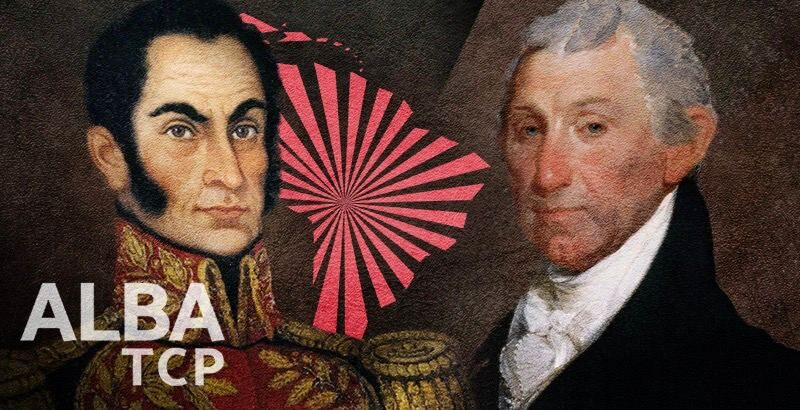
Photo composition, Simon Bolivar (left), James Monroe (right) and ALBA-TCP logo (background). Photo: United World.
By Sergio Rodríguez Gelfenstein – May 15, 2024
Two weeks ago, the Bolivarian Alliance for the Peoples of Our America – People’s Trade Treaty (ALBA -TCP) held its XXIII summit in Caracas, Venezuela. Two readers wrote to me separately, asking if I wasn’t going to write about that event. Coincidentally, a few days later the General Secretariat of ALBA, which has its headquarters here in Caracas, invited me to give a presentation at the seminar “Latin American and Caribbean unity in the face of imperial geopolitics.” The text that follows is a summarized version of said presentation in which I try to contribute to the construction of this idea and this alliance.
Talking about ALBA forces us to do a retrospective analysis that provides the principles on why that proposal has emerged initially. For that, I am going to go back a little to understand the historical context in which Simon Bolívar’s struggles took place and to study his legacy, which is still present today. Because, guided by Bolívar’s ideas, an alternative to neoliberalism can be built today.
The history of Our Independent America is the history of the confrontation between two ideas: the Monroist and the Bolivarian. James Monroe designed a foreign policy for the United States that in the first instance sought to distance – in its own interest – Europeans from America. They assumed that America was a region destined by God to be dominated by the United States. That’s where the policy of “Manifest Destiny” comes from.
Monroe presented this concept in speech before the US Congress in December 1823. Bolívar responded almost immediately to Monroe’s idea. This was a time when struggles for independence were culminating. In 1824, two days before the Battle of Ayacucho, Bolivar called for the independent countries to meet in Panama in a Congress where the foundations of the Latin American unity were to be laid.
From then on, the United States began to build its idea of integration, the Pan-American idea, which is based on its hegemony over the region. This idea was opposed by the Bolivarian proposal that stated that “Our America”, as Martí later called it in a broader vision, had to build its own identity and carry out its own integration process. This contradiction is still not resolved today.
The Bolivarian idea was frozen in time after the death of the Liberator in 1830 and it seemed that it had been completely defeated and could no longer have space on our continent.
However, already in the 19th century, even in part of the 20th, there were attempts to advance Bolívar’s idea, perhaps to build an ALBA at that time without the United States. Between the years 1847 and 1865, three congresses were held (two in Lima and one in Santiago de Chile) in which participants from various countries met. Their goal was to keep the Bolivarian idea live and to return to the ideal of unity. During this period stand out the Chilean Francisco Bilbao, the Uruguayan José Enrique Rodó, the Argentines Juan Bautista Alberdi, Juan Manuel de Rosas and Felipe Varela, the Puerto Rican José María de Hostos, the Hondurans Francisco Morazán and José Cecilio del Valle, the Colombian José María Torres Caicedo and José Martí, the apostle of Cuban independence.
Latin America and the Caribbean have moved in this area of contradictions for almost 200 years: The Bolivarian idea of Latin American unity remained submerged and extinguished for a long time. The Latin American people had no options, the first great alternative for freedom – which still exists today – was the Cuban revolution that brought a different option to our continent.
Two decades later, in 1979, the Sandinista Popular Revolution triumphed, continuing the process initiated by Cuba. It is important to know this, especially for the new generations to know that the struggle of the people of Our America has continued over time for more than 200 years.
The last decade of the last century after the end of the bipolar world and the disappearance of the Soviet Union and the socialist camp was one of chaos. It was about looking for a paradigm to organize the world and there was no clear idea. Most of the humanity wanted there to be greater equity, a more democratic international institutional framework, a fairer redistribution of income. They desired for the planet’s predatory consumerist model to disappear. They wanted greater equality in the distribution of resources, so that these could be used – since there were not going to be more wars – for health, education, scientific development and agriculture.
However, that did not happen. The people of Latin America and the Caribbean understood that they had to organize themselves, but they had to do it in a different way, because what had happened during the 19th century and during most of the 20th century had not given positive results regarding the freedom and happiness of our people.
Under the idea of fighting terrorism, after September 11, 2001, the United States restructured its military apparatus in Latin America, the Caribbean and in the world. This was happening when the 20th century ended and the 21st began, but in Caracas a bell was heard before. In December 1998, in the presidential elections, the Venezuelan people decided that things had to change and elected Commander Hugo Chávez as President of the Republic of Venezuela.
President Chávez came to power with a country that, being the fifth largest oil producer in the world, had 51% poverty and 20% extreme poverty. One million two hundred thousand were illiterate. One million four hundred thousand children could not enter school, because their parents could not pay it. Venezuela was a country where the mother saw her children die because they did not have health care, a country whose oil was sent entirely to the north, because Venezuela did not have any oil agreement with the countries of the global south.
In this situation, President Chávez took on the task of beginning to change this unjust structure and to recover the Bolivarian project that had been truncated in 1830. With this objective, he began the execution of profound economic, political and transformations. that resulted in an improvement in the living conditions of the population.
Chávez recovered the oil industry for the people and placed it under the country’s sovereignty. Washington evidently did not like that. For them, it was unacceptable that, being the master of the world, they could not lay the foundations and set the guidelines for Venezuela’s behavior. Even worse, this example could spread throughout the region and the world.
Chávez understood that by appropriating its energy wealth, Venezuela could and should use it as an instrument of liberation and independence for the peoples of America. When talking about energy, it must be remembered that it is not only about oil, of which Venezuela has the largest reserve on the planet, but also gas, water and oxygen, which the region has in abundance.
It was no longer about achieving the political independence that had been achieved at the beginning of the 19th century, but rather the economic independence that had to be achieved to be truly free. To do this, the resources of the region (and those of Venezuela as part of it) had to be put at the service – not only of the Venezuelan people – but also of the brother peoples of Latin America and the Caribbean.
Other countries in the region began to develop their own processes of awareness and emancipation. Popular governments installed one after another that undertook progressive, popular and democratic processes. The countries of Latin America and the Caribbean began to know each other and have closer ties. Likewise, they understood that everyone’s needs were the same, and “surprisingly”, they discovered they had complementary economies and that if fair trade could be established between peoples, the space of freedom could be expanded little by little. Other countries joined with governments that, even having a greater or lesser degree of relationship and even subordination with the empire, were at the end governments that had to respond the force of necessity generated by the crisis that overwhelmed and that overwhelms the region and the world. Hence, they were forced to produce a rapprochement with their peers.
Today, the crisis is not expressed in a single aspect but is already multiple: it concerns energy, food, the monetary system; it is ethical, moral, and it is political. Therefore, it has been configured as a total crisis, which does not affect to a single country in a certain area of the planet. We can already observe outlines of a structural crisis, a crisis of capitalism.
These elements of analysis allow conclusions to be drawn in favor of explaining the reasons for the need for the emergence and validity of ALBA, because conditions have been created to resume Bolívar’s project. And not only that of Bolívar, but also regarding the ideas of other founding fathers of Latin American and Caribbean nationality, of ‘Our America’, as Martí had called it.
Already in 1814, Bolívar outlined his view on this matter when he said: “It is necessary that the strength of our nation be capable of resisting the aggressions that European ambition may attempt; and this colossus of power that must oppose that other colossus can only be formed from the gathering of all of southern America under the same body of nation, so that a single central government can apply its great resources to a single purpose: that of resisting with all of them the external attempts, while internally multiplying the mutual cooperation of all of them will elevate us to the summit of power and prosperity.”
Later, in the Letter of Jamaica of 1815, he advanced his project: “It is a grandiose idea to try to form the entire New World into a single nation, with a single bond, linking its parts to each other and to the whole. Since it has already an origin, one sole language, customs and a religion, it should therefore have a single government, which would confederate the different states that are to be formed…”
The ALBA is a concrete expression of these ideas. Bolívar could not fully dedicate himself to that objective because the petty ambitions of the oligarchies had the upper hand in the newly independent nations. Since then, local power elites have insisted that integration is impossible, because “we are very different.” On the contrary, in the Jamaica Letter, Bolívar teaches that because they are different, the people of America are stronger. But we have been taught that we are weak because we are different. The truth is that being made up of diverse peoples, America is invulnerable. You just have to learn to manage and impose that invulnerability.
Being a continent with enormous reserves of water, gas, oil and land, America could offer energy, water, oxygen and food to the entire planet, but this requires financial resources that it does not have. Crating these requires cooperation, but not of any kind. “Orphan” cooperation, if it does not have other ingredients, if it is not given a humanitarian sense and respect for the sovereignty of peoples, has no value, because cooperation cannot be transformed into a colonial instrument of domination.
For this reason, cooperation within the ALBA framework must be based on the principles of solidarity, respect for sovereignty, equality, and complementarity. Solidarity has to do with cooperation being unconditional, free from impositions. Because it is not cooperation, when offered under measures of force. That’s called intervention.
Cooperation in ALBA is decided by the member countries by common agreement, without impositions, because they act on a level of equity and complementarity. This means that in cooperation, there are no aggressive donors and passive recipients. Within ALBA, complementarity means that each person contributes according to what they can, with everyone participating with equal rights and duties. That is, participation must be equal. Another principle of ALBA is that of sovereignty. Each action must be based on unrestricted respect for the sovereignty of each country, a sine qua non condition to be able to participate.
These are the principles that govern ALBA. It is the different thing that we want to build by appropriating the Bolivarian project again. Today, ALBA is already a conglomerate of ten countries, with almost 2 and a half million km² and more than 50 million inhabitants that has a presence in the Caribbean, in the bowels of the Andes and in the north of South America, as well as in the heart of Central America. In ALBA, English and Spanish are spoken as well as Aymara, Quechua, and Guaraní. It is an alliance of diverse countries throughout the entire territory of Latin America and the Caribbean.
ALBA is a reality that has to become better, because it is a project that is not completely written. It is still being born; it is being built by the people. It is a conjunction of social organizations, parties and governments, which must be united around the Bolivarian idea to obtain good results.
One of the differentiating characteristics ALBA should have is that it must be built collectively, because no one has the absolute truth regarding how to develop the process. Only the creativity and great wisdom of the people is what will allow us to build this work that should belong to everyone.
The ALBA was born just twenty years ago. No one knew what it was going to be like. It arose from the ideas of Fidel and Chávez and thus began to materialize the rebirth of the Bolivarian ideal, to become reality in the ALBA by the mere conviction that the only way to win is by being united. It has been shown that it is possible if it has the participation of everyone, with a conscious contribution from each one, creating, thinking and contributing on the path to the second independence. That is the objective of ALBA.
https://orinocotribune.com/alba-future- ... caribbean/
Argentina: Congressman Files Case Against President Milei for Using Public Funds to Finance Personal Trip
MAY 18, 2024
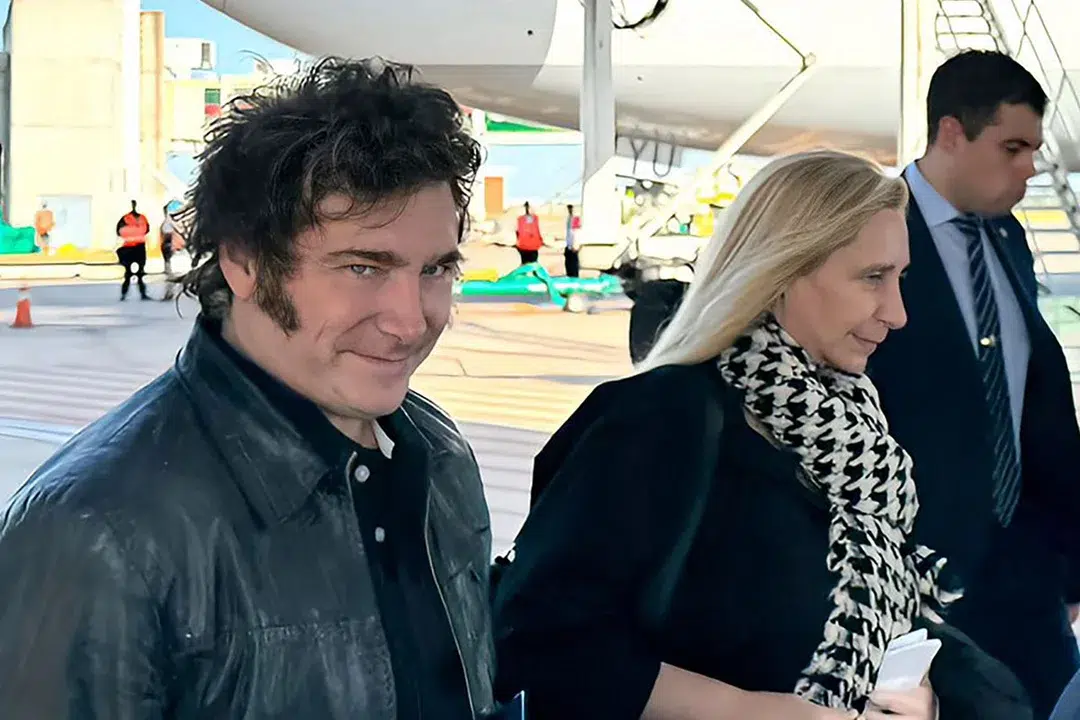
Argentinian President Javier Milei and his sister Karina Milei before boarding the presidential plane to head to Spain on a private trip. Photo: Data Clave.
Argentinian Congressman Gabriel Solano has sued President Javier Milei for using public resources to pay for a private trip to Spain.
The lawsuit refers to the three-day trip that the Argentinian president started this Friday, May 17, in Madrid. During this time, Milei will not attend any state event in Spain.
In fact, the only three activities announced by the Casa Rosada are the presentation of Milei’s book, El camino del libertario (“The Libertarian’s Path”), a meeting with business owners, and the Europa Viva 24 summit, which will be headed by far-right politician Santiago Abascal, leader of the Spanish neo-nazi party Vox.
“I have just filed a criminal complaint against Javier Milei and Karina Milei, Milei’s sister and general secretary of the Presidency, for using public funds and assets, including the presidential plane, to travel to Spain to participate in activities of the Vox party,” Solano announced.
The Workers’ Party politician published a message on social media explaining that the expenses of this trip would cost the State over $500,000.
“In my complaint, I state that the president and his sister committed crimes of fraud, fraud against public administration, abuse of authority, and embezzlement of public funds,” he added.
Solano further noted that the president himself acknowledged that the trip does not constitute an official visit. Therefore, it should not be paid for by the government.
https://orinocotribune.com/argentina-co ... onal-trip/
